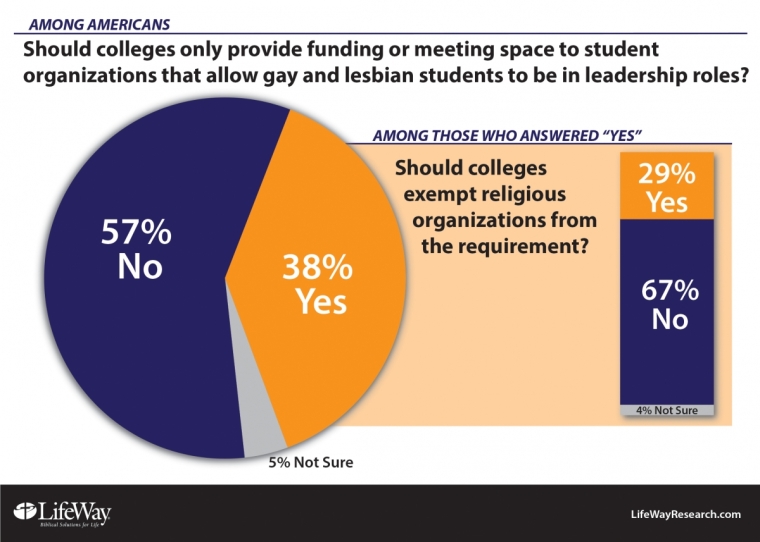Americans: Don't punish college religious groups for upholding beliefs

NASHVILLE, Tenn. (Christian Examiner) -- The push at public colleges to require student clubs' adherence to "all comers" policies is likely to return for debate in the fall according to a new survey from LifeWay Research.
In recent years, some universities have implemented "all comers" policies that require religious student organizations to accept non-believers and LGBT students as leaders--not just as members--in order to receive official recognition and school funding.
However a survey conducted by LifeWay Research from Sept. 26 to Oct. 5 and released last week shows that while people may vary in opinion on whether religious student groups should require adherence to a set of doctrinal beliefs, most can agree they do not want to see an organization punished for it if they do.
"Religious groups are defined by belief and practice," said Ed Stetzer, executive director of LifeWay Research. "An increasing number of universities are not permitting student leadership in religious groups to be defined by their own beliefs and practices. More than two-thirds of Americans stop short of denying funding or meeting space on campus despite the groups' increasingly unpopular religious beliefs and practices."
A phone survey of 1,000 Americans asked the question "Should student religious organizations, recognized by publicly funded colleges, be allowed to require their leaders to hold specific beliefs?"
About 48 percent of respondents said "no" and another 46 percent said "yes."
When asked if colleges should restrict student groups that do not allow gay and lesbian students to be leaders, the survey takers were less at odds, despite the fact that "evangelicals and Catholics often believe that sexual behavior outside of marriage, and homosexual behavior, disqualifies a person from certain leadership roles," according to the report.
Only 38 percent said colleges should restrict funding and the use of campus facilities to groups that allow gay and lesbian leaders, while a majority, 57 percent, disagreed.
LifeWay reported that individuals with no religious preference were more likely (48 percent) to say limits should be placed on groups that banned gay students from leadership roles than persons who identified themselves as Christians (37 percent) or members of other faiths (25 percent).
About one in three respondents, 29 percent, who supported "all-comers" policies also said religious groups should not have to accept LGBT students in leadership positions.
Last September, InterVarsity Christian Fellowship, an international campus ministry established on U.S. colleges and universities since 1947, lost its recognition in a number of California colleges because the group prohibits non-Christian and LGBT students from serving in leadership roles throughout the organization.
More specifically, the group would not sign a state-mandated nondiscrimination policy because, although general membership is available to all, students in leadership roles must support InterVarsity's Christian beliefs, which ban gays from leadership. As a result, by law, the colleges refused to recognize the group, and in doing so, limited funding and access to on-campus facilities.
The results of the study could have broader significance because "all-comers" policies are being pursued against other Christian groups in U.S. society.
Last month the New York attorney general's office threatened legal action against the Boy Scouts of America for its ban on the hiring of homosexuals as adult Scout leaders, even though it had lifted restrictions against openly gay Scouts.
Lifeway's survey sample stated 95 percent confidence that the sampling error does not exceed plus or minus 3.5 percent